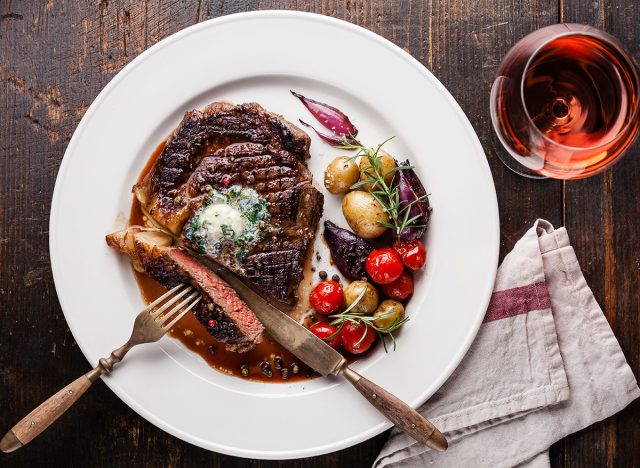What if we told you that some poor pre-bedtime habits negatively impact your weight—specifically, unwanted belly fat? Well, that’s what we’re here to break down with you today. Eat This, Not That! spoke with The Nutrition Twins®, Tammy Lakatos Shames, RD, CDN, CFT, and Lyssie Lakatos, RD, CDN, CFT, who share some nighttime habits that may be increasing your belly fat. Before you turn down your bed and get comfy, listen up!
Let’s get real: Some routines are difficult to break. But The Nutrition Twins have given us a few bedtime rituals you may be doing that you’ll want to stop ASAP—especially if you don’t want stubborn fat to accumulate in your belly.


Some people enjoy warm milk before bed to help them get to sleep. It’s no wonder, because this beverage is filled with tryptophan, an amino acid that can help you relax and feel better. The bad news is that the extra calories aren’t doing your waistline any favors.
The Nutrition Twins warn, “If this is a new nightly habit for you, and you start drinking 12 ounces of milk before bed each night and don’t change anything else in your diet, you’ll gain 12 pounds over the course of six months, and the belly is one of the most common places to see it. If you choose skim milk, you’ll still gain more than six pounds over the six months.”


If you’re scrolling before dozing off, put the phone down ASAP! “The blue light emitted from cell phones and computers suppresses melatonin and disrupts circadian rhythm and a good night’s sleep,” The Nutrition Twins say. “When you don’t sleep soundly, the brain wants energy and craves sugar. It’s easy to end up overeating sweetened foods in an attempt to keep the brain awake. Also, without enough sleep, hormones are influenced, making it harder to maintain metabolism-boosting lean muscle tissue, and easier to gain body fat.”


Caffeine is a real killer when it comes to solid Z’s. It should come as no surprise that having a powerful cup of joe too late in the day can keep you up at night. According to a study published in the Journal of Clinical Sleep Medicine, caffeine consumed six hours before bedtime can really mess things up, wreaking havoc on a restful night’s sleep. This is true not only for your sleep patterns but also when it comes to weight gain. Harvard Health Publishing reports that a sleep deficit is connected to increased levels of the ghrelin hormone which makes you hungrier and can contribute to weight gain.
READ RELATED: 7 Restaurant Chains Closing Locations In 2023


Sure, staying up late to catch up on your favorite flicks is understandably addicting, but binging on shows can lead to binging on unhealthy snacks! According to research, streaming TV is connected to a higher amount of calories consumed and a poor diet. In addition, advertisements are not always the best influences; they can actually entice you to want unhealthy snacks while watching TV!


Eating too close to bedtime is a major no-no. Ideally, you should eat your last meal of the day three or more hours before you hit the sheets, The Nutrition Twins explain. “When we sleep, we shut down digestion and work on repairing and healing our body,” they add. “If there is food that needs to be digested in the gut, it diverts the body’s attention away from healing, as it focuses on digesting food. As you sleep, the body is trying to reserve energy, restore, and repair, those calories aren’t utilized well and they can end up with a dreaded fate, as belly fat.”
Research reveals that consuming your meals too late messes up your circadian rhythm, negatively impacting blood sugar regulation and your fat metabolism. Additionally, chowing down on a large meal dangerously close to your sleep time can trigger heartburn and indigestion, which can totally interfere with even the best sleeper’s night’s rest. This can also lead to unhealthy cravings and eating more than you planned the following day.
Alexa Mellardo










